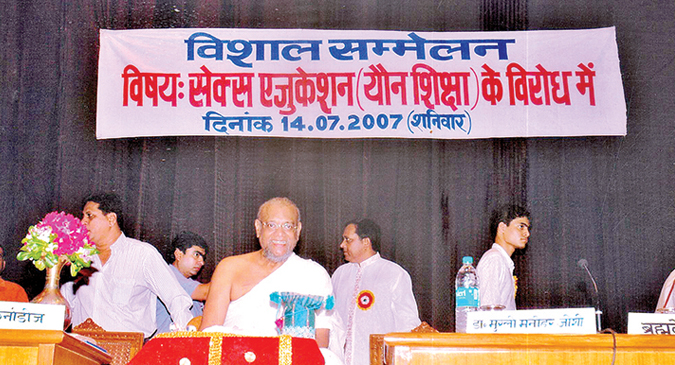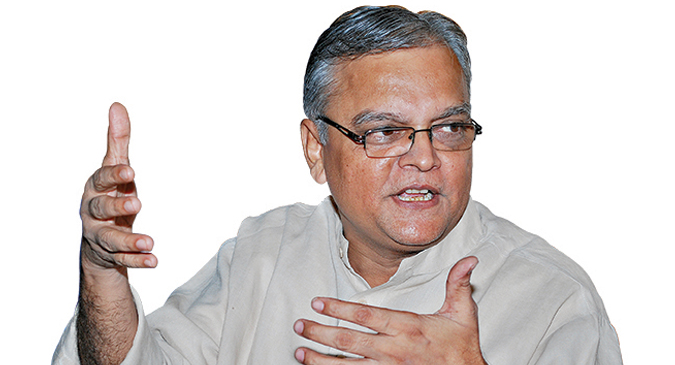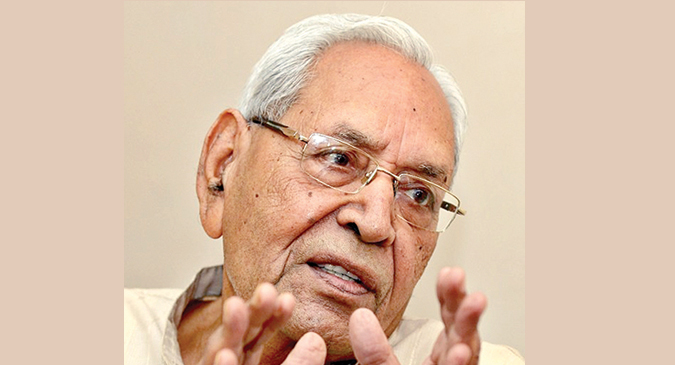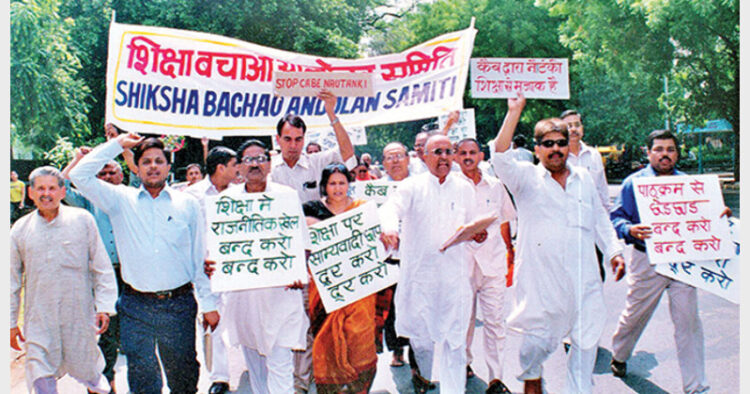After forcing various government agencies including the NCERT and University of Delhi to remove objectionable passages from their textbooks, the Shiksha Bachao Andolan Samiti made the UPA government in 2008 to withdraw the controversial sex education that it was adamant to introduce in schools. Now some very inspiring steps have been taken through Shiksha Sanskriti Utthan Nyas to reconnect the education with the Indian ethos. Organiser Chief News Coordinator Dr Pramod Kumar spoke to the Secretary of Shiksha Sanskriti Utthan Nyas Shri Atul Kothari in New Delhi to know the activities of both the organisations and their future plans as well. Excerpts:

A protest by Shiksha Bachao Andolan Samiti workers in Delhi
What was the idea behind the formation of Shiksha Bachao Andolan Samiti in 2004?
After the change of guard at the Centre in 2004, the first target of the United Progressive Alliance (UPA) government was education. From HRD Minister to the gang members of left historians and educationists started crying ‘detoxification’. Then I was in ABVP. I spoke to Shri Dina Nath Batra ji and we agreed to launch a movement against the so-called ‘detoxification’ by the Congress and left gang. By involving about 90 eminent persons from the field of education, Batraji launched Shiksha Bachao Andolan Samiti (SBAS) on July 2, 2004 in Delhi. Gradually, many educational institutions, organisations and educationists joined this initiative.
What are the major milestones during this journey of SBAS?
It is one of the most successful movements in post-Independent Bharat. From 2004 to 2013, the decisions of eleven courts (from lower courts to the Supreme Court) were in our favour. We did not lose even a single case. Many issues were resolved even without going to court. Nobody could question our intention because we were backed by courts’ verdicts. It was a movement against a national and international conspiracy against Bharat. The faulty curriculum has disconnected our generations from their roots, culture and values. SBAS exposed that global conspiracy. In 2007, when the country was to be pushed into a big crisis by introducing sex education, we created a big movement against that and finally forced the then government to withdraw the dangerous proposal, which basically aimed at turning Bharat into a big market for condoms. It was because of the SBAS agitation that curriculum designed for sex education became a matter of discussion. Till the year 2004, whenever the matter of education came up, only the left intellectuals dominated the discourse. Now they have been thrown out along with their devious game plans. Objectionable chapters and words from the textbooks were removed. There are many other victories too.

Noted Jain saint Acharya Vijayaratnasunder Surishwar Maharaj at the Sammelan in Delhi against sex education on July 14, 2007
“If we have to transform the country we have to change education and instead of problems we should discuss solution. The SSUN is indeed an attempt to materialise the vision of many great personalities of Bharat”
How many objectionable passages were removed from the textbooks?
About 75 objectionable passages were removed from the NCERT’s history books from 6 to 12th standard. They were removed following order from Delhi High Court. Apart from it, ‘Three Hundred Ramayanas: Five Examples’, taught in University of Delhi and which portrayed Ramayana characters into very bad light was removed. Oxford professor Paula Richman along with Romila Thapar had written a controversial book, ‘Many Ramayanas’ when the ‘Ramayana’ serial became very popular in Bharat. ‘Three Hundred Ramayanas: Five Examples’ was a chapter in that book. This proves the global conspiracy to disconnect the Indians from their roots. We fought against it for about five years. We had to approach Delhi High Court and then the Supreme Court against it and finally it was withdrawn.
How the SBA was converted into Shiksha Sanskriti Utthan Nyas?
SBA and Shiksha Sanskriti Utthan Nyas (SSUN) are separate bodies. SBAS was started as an immediate requirement. As we started the movement, people from across the country started joining it and exposing the anomalies in textbooks. On April 10, 2007, the people who envisioned this movement met in Bhopal to discuss its future course. From that discussion, the idea of starting a concrete activity for Indianisation of education was envisioned. The SBAS has belied the myth that agitation and scholars cannot move together. SBAS is still working and I am its co-convener. The Nyas was formally constituted on May 24, 2007.

“Those who are opposing the three language formula are doing it for their political gains. They are harming the interests of their own children”What are the different dimensions of SSUN in all these years?
In 2007, we started some academic activities but the direction was not very clear. We have formed a trust as per the legal requirements, but our overall plan about the trust does not have a formal organisational structure. We want to have it as a platform where the like-minded people come together all over the country. In 2008, when I was shifted here from ABVP, we decided to accelerate this structure. I not only had a long discussion with scholars but also practically witnessed the innovative experiments being done in the education sector. We thought about how to popularise such experiments at other places also. Then we decided to give a new direction to education sector of the country. I realised that if we have to transform the country we have to change education and instead of problems we should discuss a solution. The SSUN is indeed an attempt to materialise the vision of many great personalities of Bharat.
What are the major activities of the Nyas?
When we blocked the game plan of sex education in 2008, many people asked us how we would resolve the problems of adolescent children. From February 9 to 10, 2009, we organised a national conference in Pune to discuss the alternative to sex education. The outcome of that discussion was character building. We started work on it from that conference itself and prepared the curriculum within six months. The Petition Committee of Rajya Sabha, headed by present Vice President of India Shri M. Venkaiah Naidu had also proposed to start character building education instead of sex education. When we deeply started work on it, we realised the main objective of education is basically character building. When somebody asked Swami Vivekananda about the goal of education he termed it as ‘man making and character building’. Hence, it is the fundamental goal of education. During the process of preparing that syllabus, we organised over a dozen workshops across the country to gather inputs from scholars. By the end of 2010 the process of developing the curriculum was over. It was first implemented in the tribal district of Jhabua, (MP) in 2012. Today, these activities are going on in about 300 schools across the country in different forms. We have organised over 400 workshops for teachers on this issue. We have been able to prepare about a dozen models of this project. About four years back we started a certificate course in three universities. The project has shown remarkable results wherever it has been implemented. It is because of this we today could see exams without supervisors at hundreds of places. Gradually, the number of such students is increasing. Vinoba Bhave in his book ‘Geeta Pravachan’ says that most people normally talk more about damage and not about the good which is still available. If we make sincere efforts, today also we can get better results than the ancient Nalanda University. It is said that 10,000 students studied in Nalanda and disciplinary action was not taken against even one of them. It is possible today also. The samskars of our rishis and seers are still there, we need to remove the dust only.
A Fight against Distortions in Education
July 2, 2004 when it was formed to counter the ‘detoxification’ attempts in education by the then Congress-led UPA government and the left gang, the Shiksha Bachao Andolan (SBA) is a concrete initiative to reshape the education system of the country and fight against the distortions that have been done in the history textbooks being taught from schools to universities. Since inception, it has taken up the drive against distortions in a systematic manner. Its focus has been to identify and correct the anomalies in the education policy. It is not merely limited to minor corrections of mistakes; its objective is to identify and resist the intellectual imperialism that seeks to target and debase the knowledge of communities, their languages and culture through international and national networks. So far, eleven courts from lower courts to the Supreme Court have delivered verdicts in favour of the Andolan. Apart from it, the SBA is engaged in providing a framework for a credible alternative system of education. It was because of the sustain efforts and struggle by the SBA that the UPA government in 2008 withdrew the controversial sex education in schools. Apart from educating the countrymen through various activities, it collected about four lakh signatures against this vicious move by the Congress regime.

Shri Dinanath Batra
“We do not want Hindi or any other language to be imposed and we request the Govt to do the same. We should give options to the children to choose any three of them” How did the work begin for promotion of Indian languages?
Till the year 2015, we used to say that our focus is mainly on six topics and mother tongue was one of them. We started work on it because we realised that actual change in education cannot be achieved until and unless the mother tongue becomes the medium of instruction. When we discussed this matter with some scholars they discouraged us saying ‘you are fueling the fire’ because the language has been a matter of discord in independent Bharat too. But we did not turn back. We continued our efforts. In our first conference, about 100 persons came. But now we have started two separate platforms for it—Bharatiya Bhasha Manch to mobilise people working on Indian languages and the Bharatiya Bhasha Abhiyan to ensure justice in courts in Indian languages. We are not against English. Everyone is free to learn it, but we believe that imposing a foreign language is wrong. Through both these platforms, we have been able to make language a matter of mainstream discussion and many positive steps are being taken.
But now a controversy is being created in the name of language after the draft education policy stressed on it?
We need to look at it from both sides. Those who are opposing it are doing it for their political gains. They are harming the interests of their own children. As the communication of people is gradually increasing, Hindi is emerging as the link language all over the country. The children and youth understand this fact and they want to learn Hindi and other Indian languages. We do not want Hindi or any other language to be imposed and we request the Government to do the same. We have 22 Scheduled Languages and could add English as 23rd if there is so much of need. We should give options to the children to choose any three of them. We need to seriously think about this formula.
Changing Education to Change the Nation
Shiksha Sanskriti Utthan Nyas (SSUN) was formed in 2007 to provide an alternative to the current educational practices rooted in the national traditions. Its prime objective is to develop an education system rooted in Bharatiya moral and national values. Its school level curriculum for value education has been adopted by more than 300 schools across the nation. In higher education also it has prepared a curriculum for a certificate course as well as credit courses in value education and signed an MoU with eight universities for it. Similarly, it has prepared a curriculum on environment education for first to 12th standard. The syllabus has been developed for including environment in engineering and agriculture education. The Nyas has also prepared a curriculum of Vedic Maths for class 1st to 12th. It has also prepared a curriculum for a certificate and diploma course in Vedic Maths. MoU has been signed with five universities for it.The SSUN has been fighting for ensuring education in the mother tongue. Bharatiya Bhasha Manch has been formed to start a nationwide movement for restoring Bharatiya languages in higher education, competitive exams and in governance. Similarly, Bharatiya Bhasha Abhiyan has been started to ensure Bharatiya languages get due status in the courts. The Nyas also organises workshops for promoting Bharatiya view on management education. It is also working to prepare a model curriculum for teachers’ education. The Nyas has initiated efforts at school/college and university level to bring autonomy in education. It is also working to ensure that the Indian Civil Services exams get rid of the compulsion of the English language and they should be organised in Bharatiya languages also. Another significant effort by the Nyas is to bring all the individuals and organisations at one platform which are conducting out of box experiments in the field of education through Gyanotsava.
What are the major plans of SSUN for future?
In the last one and a half years, we have started two major activities – Gyanotsav and New Alternative in Education. We have been working on various activities but we do know that we alone cannot change education. We need a positive academic atmosphere in each and every educational institution to draw the desired results. Even policy alone cannot change education, it can only help. There are many individuals and institutions which are conducting good experiments in the field of education. We organised a three-day Gyanotsava last year in Delhi to bring 140 such people and institutions at one platform. We organised six other Gyanotsavas in the country last year alone. We want to give this process a big boost. We want the institutions which are doing such experiments should ensure a similar change in other institutions of their surrounding areas. This year Gyanotsava will be held in Delhi in August. RSS Sarsanghachalak Shri Mohan Bhagwat has agreed to join it. Apart from it, we also want to work on promoting alternate education. We have been gathering suggestions on Draft for New Alternative on Education and from next year we will initiate a process to create an alternate model of education in faculty/department of Medical, Engineering and Management etc. with the help of domain experts. We want to create a positive environment in the education sector in the coming days. Today the government finds it difficult to introduce any major change because the people on the ground are not ready for that. Therefore, we need a strong ground force for any good change in the education sector. In a democracy, the role of both society and government is important. We organised 35 symposiums on the new education policy and more than 6000 scholars joined them. By and large, we have to prepare the society for a change. Opening Gurukuls may not be practical today, but restoring the principles and values of the ancient education system are needed. We are working on all such issues.
“Today the government hesitates to introduce any major change because the people on the ground are not ready for that. Hence we need a solid ground force for supporting any good step”What are the other such issues?
One such issue is environment education. The environment is being taught following MC Mehta Vs Union of India verdict of 2003. But what is being taught and what is its impact is well known. We collected the syllabus of environment studies from various institutions and a team of scholars studied them. They compiled a new book by collecting all the good information from those books. We mainly added two things in that book. At the beginning of every chapter, we explained the Indian vision on that issue. It is not an emotional issue, but is very logical and practical today. It is also important to note that environment problem may be an issue of almost 100 years but the books written in India 5000 years back have hymns on environment protection. Western mindset may start thinking about the solution after the problem, but the Indian mindset ensures that problems should not develop. At the end of every chapter, we have added some activities. Problem with the present education system is that what is taught even in the higher education institutions find no relevance in practice. But the activities mentioned in the book connect the knowledge with the day-to-day problems. It is basically the spiritual vision of Bharat. We talk much about others the whole day, but we do not think for a while what we are doing. The entire syllabus should motivate the students to introspect. We are planning to accelerate the process of preparing such an alternate syllabus in the days to come. It is not for Bharat alone, it is for the entire world.
Major Activities of the SBAS & SSUN
- Value-based education for character building and overall development of personality
- Environment education
- Vedic Maths
- Education in Mother tongue (Bharatiya Bhasha)
- Bharatiya Bhasha Manch
- Bharatiya Bhasha Abhiyan
- Bharatiya view in management education
- Workshops for Teachers Education
- National workshops for Technical Education
- Autonomy in Education
- Project for Competitive Exams
- Draft for new alternatives in education
- Gyanotsava
- Shiksha Darpan: E-Patrika
Sometimes it is alleged that we are trying to push the country backwards?
It is not the question of pushing backwards. Environment and moral education were not required in the ancient time as much as they are required today. We are doing what is needed by our young generation, Bharat and the world.
You generally say “Desh Ko Badalna Hai To Shiksha Ko Badlo” (Change The Education To Change The Country).
“We are of the firm opinion that primary education must compulsorily be in mother tongue. The government should not be in defensive mode on it” Do you want to replace the present education system with the new system?
Holistic change cannot be achieved in a single day. It is done gradually by following a process. The process of holistic change will move forward by introducing the required changes in the present system only. What is relevant today may not be relevant after five years. The basic concept will remain the same but methods can change. Eternal values will not change.
Do you want to promote education in the private or government sector?
Differentiation between the private and government sector is wrong. After all, we all are working for the same society. The Government of India has said a very good thing in the draft education policy. Private philanthropic schools must be encouraged and should be supported by both the society and the government. Those who are making money through education must not be supported. The Government alone cannot impart education to all. Societal support is surely needed. Even in the functioning of government schools the society should contribute. It will substantially improve their condition. Government and society should move together.
What is your opinion about minority institutions?
In our country, political interference in education is very high. The provisions made for minorities in
the Constitution are being misused. The deprived students from minority communities should get its benefit, but it is not happening in practice. It is being misused as a form of commercialisation of education. It needs to be regulated. Minority status should not be approved until the institution has at least a certain
percentage of students, faculty and management from minority communities. Some norms should be fixed so that the actual goals set by the makers of the Constitution could be fulfilled.
Draft education policy talks about an Education Commission. On the one hand we want decentralisation of education but on the other hand, we are favouring the creation of new agencies. Why this contradiction?
We had also demanded a Commission for Education. We had called it an autonomous Education Commission like the Supreme Court or Election Commission of India. It will be constituted by involving the heads of various institutions like UGC, AICTE, NCERT, etc, educationists and prominent persons from the society as members. We have divided education into pieces and there is no connection between the school, college and professional education. That proposed commission should have units upto the district level and it should regulate the entire education system. Today, the policy and syllabus change with the change in government. Education Commission may be the remedy of all such problems.
In your opinion, the problem is more at the institutional level or at the mindset level?
The problem is more at the mindset level. If this problem is not cured now, it may become a big headache after ten years. Education shapes the public mindset. We want good citizens, society and the country but we do not get desired results because of the faulty mindset.
What is your opinion about the draft education policy?
It seems this policy has been drafted with an open mind. It addresses some fundamental issues like the objective of education i.e. holistic development of a child. Even then the government has invited suggestions up to June 30, 2019. We are studying it thoroughly and will give our suggestions within the stipulated time period. I hope education will remain a top priority for this government for all the five years. The major challenge is now to implement the policy. When the issue of language was raised, some people from opposite camps have also started supporting us. We are of the firm opinion that primary education must compulsorily be in mother tongue. The govt. should not be in defensive mode on it.














Comments